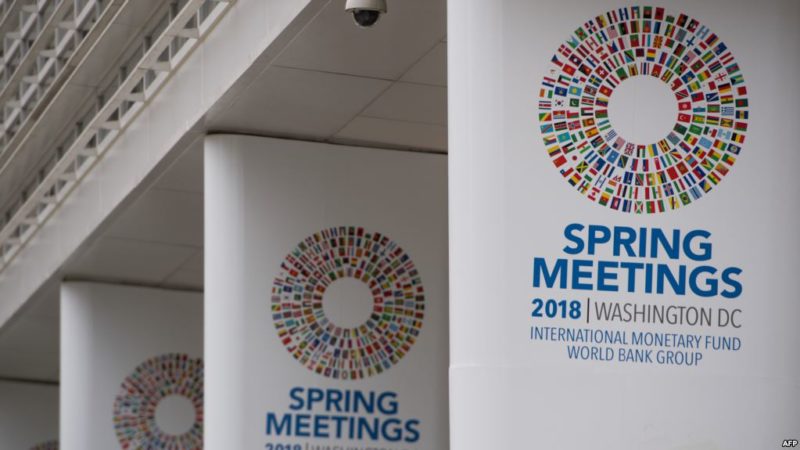Seven Multilateral Development Banks (MDBs) launched a new platform to enhance their collaboration on economic migration and forced displacement on Friday, April 20, 2018 on the margins of the IMF-World Bank Group Spring Meetings. The platform will advance strategic dialogue and operational coordination to maximise the impact of MDBs’ growing engagement in these two areas.

While economic migration and forced displacement are distinct issues and require a different response, each has emerged as a complex development challenge. There are an estimated 250 million international economic migrants worldwide, and roughly 66 million people are forcibly displaced as refugees or internally displaced persons fleeing conflict and persecution.
The new platform represents a strong effort by MDBs to enhance cooperation to address these challenges, in response to a request made by the G7. After presenting a strategic framework for action at the G7 meeting in Bari, Italy, in May 2017, MDBs worked closely together to prepare specific initiatives under the new platform.
Cooperation is ongoing. Since the platform was first announced in October 2017, MDB representatives have met several times to discuss respective approaches, results, and challenges. Four priority areas where there is high potential to increase impact have been identified to serve as the focus of the platform in the initial phase:
- refining the common framework for MDB engagement;
- advancing cooperation on knowledge, evidence, and data;
- ensuring strategic coordination on priority topics in coordination with governments, UN, and other partners; and
- deploying better-targeted instruments and products
The platform launch was attended by representatives of all participating MDBs – African Development Bank, Asian Development Bank, World Bank Group, European Bank for Reconstruction and Development, European Investment Bank, Inter-American Development Bank, Islamic Development Bank, World Bank Group – as well as G7 deputies and strategic partners including the European Commission and UNHCR.
Akinwumi Adesina, President, African Development Bank, said, “Building resilience for fragile communities is critical to reducing economic, social and political exclusion. People may live in fragile communities, but they have hope and aspirations that cannot be extinguished. The African Development Bank has been investing heavily in fragile states in Africa, helping to build education, strengthen institutions, and provide critical infrastructure, especially electricity, water and sanitation. We are delighted with this new platform which will allow us to work with other multilateral development banks, using fragility lenses to drive inclusive development.”
Ingrid van Wees, Vice-President for Finance and Risk Management, Asian Development Bank said, “The platform’s aim of fostering strategic alignment and operational coordination among MDBs is in line with ADB’s principles of partnership and collaboration with multilateral institutions and member countries. We look forward to participating, to learning from the experiences of others, and to helping develop impactful responses to these urgent development needs.”
Sir Suma Chakrabarti, President of the European Bank for Reconstruction and Development, said, “Migration is one of the biggest global challenges. It is crucial to continue enhancing MDB coordination to provide economic help for refugees, particularly, and the countries which host them.”
Werner Hoyer, President of the European Investment Bank, said, “The challenge of forced displacement and economic migration is a shared challenge- and a shared responsibility. That’s why the European Investment Bank is committed to making this new platform a success. The world’s Multilateral Development Banks can make a real difference through financing opportunity and key services – but only if we work together.”
Luis Alberto Moreno, President of the Inter-American Development Bank, said, “Migration and forced displacement are two issues very relevant for countries in Latin America and the Caribbean. We are actively working with our member countries to tackle the root causes of unsafe migration, particularly, from Central America by accelerating economic development, improving public services and strengthening relevant institutions. This platform provides a unique opportunity to join forces and learn from other experiences.”
Bandar Hajjar, President of Islamic Development Bank, said, “We are expanding our operations by getting closer to our member countries so that we can strengthen the support we provide to the people in need, especially displaced people and economic migrants. The e-education strategy for Syrian refugees initiated by IsDB is one of the efforts of the bank to build capacity among economic migrants. Earlier this month, we have launched a $500 million fund (Transform) that will provide access to resources for SMEs and innovators. This fund would help address the challenges faced by displaced people. This is in addition to our partnership with TWAS to help refugee scientists.”
Kristalina Georgieva, Chief Executive Officer of the World Bank, said, “The world is becoming richer and more fragile at the same time. We at the World Bank Group are committed to supporting displaced people, migrants, and the communities that host them, and to multiplying our impact by working more closely with other multilateral institutions.”
